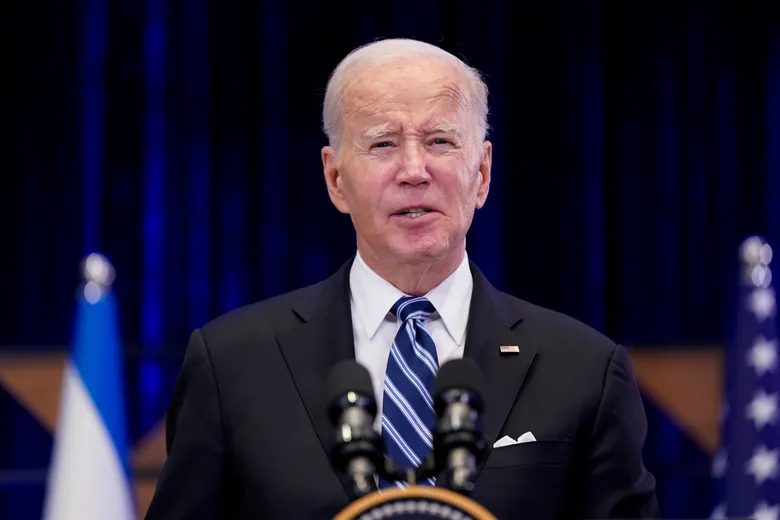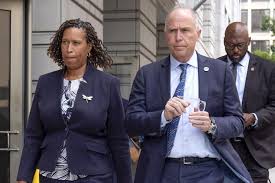Biden said he had spoken with the Israeli cabinet “to agree to the delivery of life-saving humanitarian assistance of civilians in Gaza, based on the understanding that there will be inspections and the aid will go to civilians and not to Hamas.”
“Let me be clear,” Biden said. If Hamas diverts or steals the assistance, they will have demonstrated once again that they have no concern for the welfare of the Palestinian people.”
Biden also announced an additional $100 million in humanitarian aid for Gaza and the West Bank.
Biden had also been scheduled to visit Jordan to meet with Arab leaders Wednesday, but the summit was called off after the hospital explosion. His remarks in Tel Aviv spoke both to the horrors that the Israelis had endured, but also the growing humanitarian crisis for Palestinian civilians in Gaza.
He told Netanyahu he was “deeply saddened and outraged” by the hospital explosion. But he also stressed that “Hamas does not represent all the Palestinian people, and it has brought them only suffering.” And he spoke of the need to find ways of “encouraging life-saving capacity to help the Palestinians who are innocent, caught in the middle of this.”
Biden reiterated the U.S. was firmly behind Israel.
“I want you to know you’re not alone. We will continue to have Israel’s back as you work to defend your people,” Biden said. “We’ll continue to work with you and partners across the region to prevent more tragedy to innocent civilians.”
Netanyahu said the president’s visit was “deeply, deeply moving,” adding, “I know I speak for all the people of Israel when I say thank you Mr. President, thank you for standing with Israel today, tomorrow and always.”
Netanyahu said Biden had rightly drawn a clear line between the “forces of civilization and the forces of barbarism,” saying Israel was united in its resolve to defeat Hamas.
“The civilized world must unite to defeat Hamas,” he said. U.S. officials on Wednesday also announced sanctions against a group of 10 Hamas members and the Palestinian militant organization’s financial network across Gaza, Sudan, Turkey, Algeria and Qata
Biden met with Israeli President Isaac Herzog as well as with Israeli first responders and the families of victims and those being held hostage by Hamas. He held their hands, embraced them and listened quietly as their voices cracked as they spoke of the horrors they’d seen.
Eli Beer, the founder of a volunteer emergency medical service, told Biden that through his visit “you uplifted the whole spirit in this country, and all the Jewish people in the world.”
The grim tone of Wednesday’s meetings between Biden and Netanyahu stood in stark contrast to their optimistic meeting just a month ago on the sidelines of the U.N. General Assembly in New York, where Netanyahu marveled that a “historic peace between Israel and Saudi Arabia” seemed within reach.
The possibility of improved relations between Israel and its Arab neighbors has dimmed considerably with the outbreak of the Israel-Hamas war. Israel has been preparing for a potential ground invasion of Gaza in response to Hamas’ attacks.
Roughly 2,800 Palestinians have been reported killed by Israeli strikes in Gaza. Another 1,200 people are believed to be buried under the rubble, alive or dead, health authorities said. Those numbers predate the explosion at the Al-Ahli hospital on Tuesday.
Protests swept through the region after the blast at the hospital, which had been treating wounded Palestinians and sheltering many more who were seeking a refuge from the fighting.
Hundreds of Palestinians flooded the streets of major West Bank cities including Ramallah. More people joined protests that erupted in Beirut, Lebanon and Amman, Jordan, where an angry crowd gathered outside the Israeli Embassy.
Outrage scuttled Biden’s plans to visit Jordan, where King Abdullah II was to host meetings with Palestinian President Mahmoud Abbas and Egyptian President Abdel Fattah el-Sissi. But Abbas withdrew in protest, and the summit was subsequently canceled outright.
Ayman Safadi, Jordan’s foreign minister, told a state-run television network that the war is “pushing the region to the brink.”
Jordan declared three days of mourning after the hospital explosion and Safadi said the summit was canceled after speaking with all leaders. He said they had wanted the meeting to produce an end to the war, which seems unlikely now, and to give Palestinians the respect they deserve.
Kirby said Biden understood the move was part of a “mutual” decision to call off the Jordan portion of his trip. He said Biden would speak to Abbas and el-Sissi by phone Wednesday as he returned to Washington.
There are also fears that a new front could erupt along Israel’s northern border with Lebanon, where Hezbollah operates. The Iran-backed organization has been skirmishing with Israeli forces.
Always a believer in the power of personal diplomacy, Biden’s trip is testing the limits of U.S. influence in the Middle East at a volatile time. It’s his second trip to a conflict zone this year, after visiting Ukraine in February to show solidarity with the country as it battles a Russian invasion.
___
Long reported from Washington. AP Diplomatic Writer Matthew Lee in Tel Aviv, Israel, Associated Press writers Omar Akour in Amman, Jordan, Samuel McNeil in Jerusalem; Chris Megerian, Will Weissert and Darlene Superville in Washington; and Edith M. Lederer at the United Nations contributed to this report.





